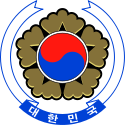- Chief Justice of the Republic of Korea
-
South Korea 
This article is part of the series:
Politics and government of
South KoreaGovernment National Assembly
political parties
GNP · DEP · LFP · FHA · DLP · PPP · NPPSupreme Court
Chief JusticeElections Presidential elections
1997 • 2002 • 2007Legislative elections
2000 • 2004 • 2008Local elections
2002 • 2006 • 2010By-elections
2011Related topics Korean reunification
Sunshine Policy
Administrative divisions
Human rights
Foreign relations
The Chief Justice of the Republic of Korea is the Chief Justice of the Supreme Court of Korea. The Chief Justice is considered the head of the judicial branch of the South Korean government.
The current Chief Justice of the Republic of Korea is Lee Yong-hun.
Appointment and tenure
The Chief Justice is appointed by the President of South Korea, and subsequently confirmed by the National Assembly of South Korea. Like the other Justices of the court, the Chief Justice serves a term of six years. Unlike the other Justices, the Chief Justice may not be reappointed for subsequent terms of office.
By law, the Chief Justice of the Republic of Korea must retire upon reaching the age of 70.
Powers and duties
The Chief Justice is the head of the judicial branch of the government of South Korea, and has both adjudicatory and administrative duties. It is the duty of the Chief Justice to preside over a Grand Bench of the Supreme Court, and he or she participates in rendering the decision of the court.
In addition to the deciding of cases, one of the most important duties of the Chief Justice is in the appointment of people to the judicial bench. The Chief Justice is responsible for recommending Justices to the Supreme Court of Korea to the President of South Korea. In addition, the Chief Justice designates three of the judges who sit on the Constitutional Court of Korea. The Chief Justice also appoints the judges for all of the other courts of South Korea, and these appointments are then confirmed by the Supreme Court Justices Council.
The Chief Justice also holds the responsibility for most of the day-to-day operation of the judicial branch of the government of South Korea. He or she may present an opinion in writing to the National Assembly on the need for changes in the laws governing judicial processes. The Chief Justice also presides over the Supreme Court Justices Council, which provides rules and other important administrative functions for the judicial branch. Additionally, the Chief Justice directs the general administration of the judicial branch.
Many of the day-to-day administrative powers of the Chief Justice may be delegated to various court officials, the most important of which is the Minister of Court Administration. The Minister of Court Administration is technically a Justice of the Supreme Court, but does not hear or decide cases, but rather oversees much of the administration of the courts of South Korea with the direction of the Chief Justice.
External links
- www.scourt.go.kr The Supreme Court of Korea
Categories:
Wikimedia Foundation. 2010.
